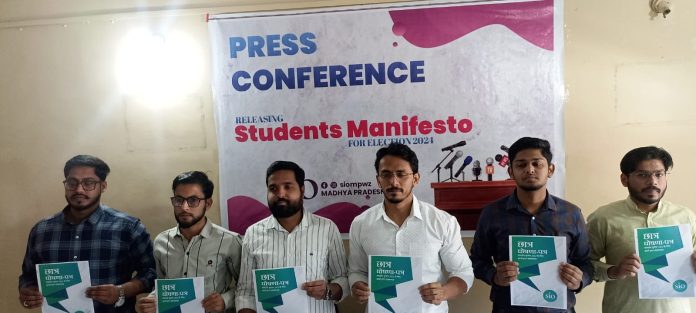– Pervez Bari
Bhopal, March 10: The Students Islamic Organization of India (SIO), Madhya Pradesh released the students manifesto here Friday, addressing crucial issues affecting education, minorities and social welfare in India.
The SIO National Secretary, Adv. Anis Rahman, and Madhya Pradesh State president Dr. Farhan Adil addressed a joint Press Conference and shared details of the manifesto. The student manifesto encompasses key demands for the 2024 general elections, highlighting the following points:
- Establishment of an unbiased, just and fair reservation system to ensure equal opportunities for all;
- Special attention on socially and economically disadvantaged districts and focussed development in underprivileged areas;
- Implementation of the Rohit Act to ensure justice and security in educational institutions;
- Revival of the Maulana Azad National Fellowship and increased scholarships for minorities, providing financial assistance for equal access to education;
- Enactment of anti-discrimination laws for a society free from bias and prejudices;
- Implementation of strict personal data protection laws and a privacy charter for people’s confidentiality and data security;
- Allocation of 1000 crores for environmental initiatives and sustainable development activities;
- Establishment of health and mental well-being centers for youth across India, prioritizing holistic development;
- Ensuring free and compulsory education from primary to university level for all;
- Introduction of an Employment Guarantee Act to secure jobs and opportunities for the country’s youth.
During the Press conference, SIO leadership expressed concern about alarming trends in India’s educational landscape. Despite an overall literacy rate of 74.04 percent, which falls below the global average of 86.3 percent, several states are struggling to surpass the national level.
Dr. Farhan Adil raised concerns about reducing major educational programs for religious minorities, diminishing the budget allocation for Ministry of Minority Affairs, and the inadequate 2.9 percent share in total domestic product, significantly below the mandated 6 percent target, according to the NEP 2020.
He highlighted the disparity in budget allocation, pointing out that India allocates only 2.1 percent of its GDP, whereas countries like Japan, Canada, and France allocate around 10 percent for public healthcare. Unemployment emerged as a significant issue, with approximately 10 lakh vacancies in various ministries till March 1, 2023.
Adv. Anis Rahman emphasized the high dropout rates among Muslim students, citing data from the Institute of Objective Studies indicating a dropout rate of 23.1 percent, exceeding the national average of 18.96 percent. He also addressed the decline in Muslim student enrolment from 5.5 percent in 2019-20 to 4.6 percent in the academic year 2020-21.
Expressing concern over mental health crises, Adv. Rahman highlighted data from the NRCB, indicating a rising trend of suicides among individuals aged 15 to 30, with an average of 34 students taking their lives every 42 minutes.
Adv. Rahman referred to Amnesty International and DOTO databases, indicating an alarming increase in hate crimes. He urged immediate attention to safeguard lives and address religious discrimination.
He stressed that students and youth constitute a significant voting bloc in the country and called on political parties to invest in the nation’s future. Rahman emphasized that the student manifesto seeks concrete electoral commitments, focusing on accessible and quality education, employment, peace, and a secure environment.




